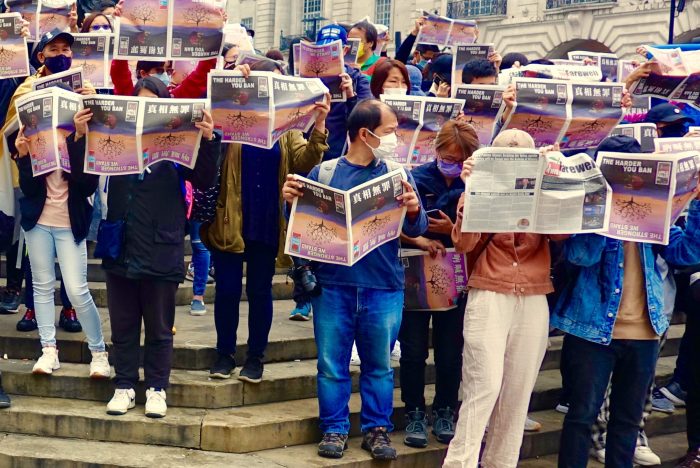
Hong Kongers were mourning the forced closure of Apple Daily, a populist, sometimes bawdy, always staunchly pro-democracy daily launched as the “Hong Kong people’s newspaper” in 1995, when more bad news dropped for the city’s once-vaunted press freedom.
[Read: As Hong Kong’s Apple Daily goes dark, the newspaper’s web, app, and social content disappears too]
The former managing editor of Apple Daily’s English edition and lead Chinese editorial writer Fung Wai-kong (who wrote under the pen name Lo Fung) was arrested at the Hong Kong International Airport on June 27 as he prepared to leave for the UK. He is accused of conspiring to collude with foreign forces and is the seventh senior Apple Daily journalist to be arrested on national security charges in two weeks.
The paper Fung wrote for was undoubtedly flawed, with its sensationalist coverage and ethical lapses, but it also exposed corruption in high places, won awards for its investigative reporting, and dared to stand up to Beijing. Its existence was a barometer of Hong Kong’s press freedom and freedom of expression.
The end of Apple Daily on June 24 wasn’t a surprise. But that it came at such short notice, following dramatic raids, the arrest of senior journalists and the freezing of its assets has already had a chilling effect on the rest of Hong Kong’s media.
Many in the sector have harbored fears that independent online media would be next. Sure enough, hours before news of Fung’s arrest broke, Stand News announced a slew of pre-emptive measures to reduce risk to its staff, authors, and supporters. The platform is a nonprofit, independent online news outlet that has reported extensively on Hong Kong protest movements and provides a platform for voices of civil society. Among the measures was the temporary removal of all opinion articles published in and before May this year.
Joy* joined Apple Daily in November 2019, at the height of the protests, due to the censorship she says was practiced by her previous employer, the main terrestrial broadcaster TVB. “There was much more freedom at Apple Daily,” she says. “In my heart, I still want to be a journalist, but my only remaining choices are Stand News and Citizen News. Yet they’re likely to be the government’s next targets.”
Another journalist, Max*, who currently works at Citizen News, admits he does worry: “We’re always saying we might not be able to carry on for much longer, maybe a year, or maybe even that’s too optimistic.”
But Max insists that even if the platforms disappear, there will be journalism as long as there are journalists. He himself is a member of the former i-Cable China team that joined Citizen News en masse after the mass resignations there last year. His experience has prompted him to urge former Apple Daily journalists to set up their own teams and journalistic ventures.
He told me: “I’m always reminding myself that when mainland [Chinese] journalists are still striving within and outside the system … how can we give up so easily?”
Bruce Lui is now a senior lecturer in journalism at Hong Kong Baptist University, but he too formerly worked for the storied i-Cable China Team. Lui says journalism schools used to teach students how to be journalists in a free society. But as Hong Kong loses more of its freedoms, “we have to help students understand how to report in Mainland [China], because the environment is increasingly converging with that of the mainland, where there are many clear and hidden rules,” Lui says. “Behind them are a bunch of political intentions, controlling these regulations, determining the rules of the game.”
Another journalism lecturer, who did not want to give her name, agrees. She told me, “Fewer students may want to become journalists, but those that do are more serious about it. They pay great attention to topics like source protection in class. They have no fantasies or illusions about journalism. They know it’s hard. They know they could end up in prison.”
When I spoke to Charis*, a journalism student who reported from the frontlines of the 2019 anti-extradition bill protests in January last year, she said her experiences had hardened her resolve to become a journalist.
Now she’s conflicted because Hong Kong’s national security law, passed in 2020, has made it more difficult to report, and the crackdown on independent and critical media means there are fewer outlets where she’d be able to report freely.
Many journalism students used to aspire to work for RTHK, but Charis recently turned down a coveted internship there because new rules would have required her to swear an oath of allegiance to the Hong Kong government.
“I’m going on exchange to Taiwan in September, but in June Taipei issued a form where anyone seeking to reside there had to declare whether they had sworn allegiance to the Hong Kong government … I realized that swearing the oath could affect my whole future,” she explains.
Despite the setback and her concerns about how the Hong Kong mediascape will look when she graduates in a year, Charis hasn’t given up on journalism just yet. “It’s a difficult path the tread and press freedom is forever shrinking. But I still hope we can use any remaining freedom to report the best we can. I believe that as long as there are people willing to do so, there will be space to practice journalism.”
*The names of the journalists in this article have been changed to protect their privacy.
Yuen Chan is a senior lecturer in the department of journalism at City, University of London. This article is republished from The Conversation under a Creative Commons license.![]()